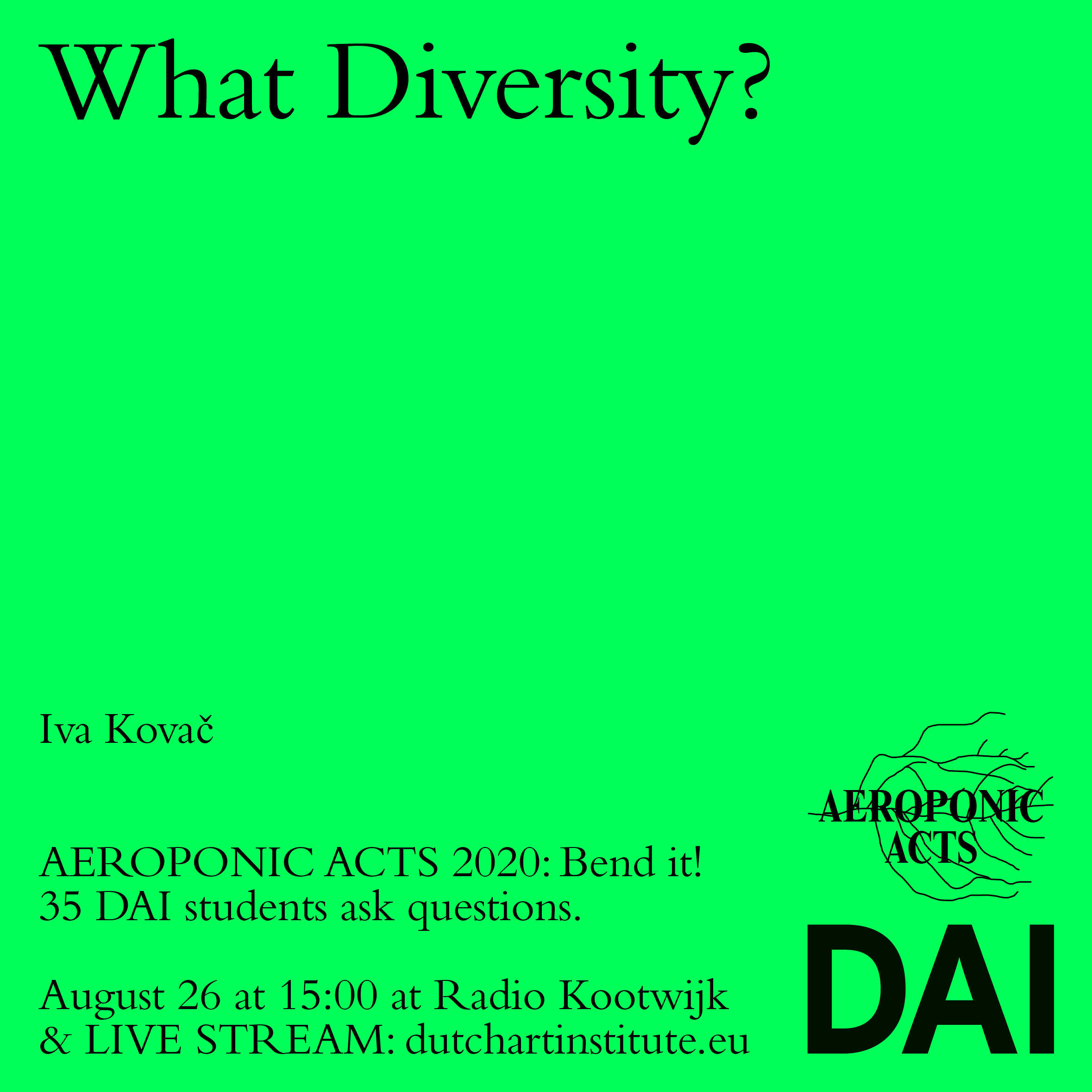Iva Kovač: Rijeka 2020 – Port of Diversity
‘Aeroponic’ – root systems nourished by air – Acts is the name given to the nomadic Dutch Art Institute’s final Kitchen presentations. Each participant addresses one question.
Here you will find the documentation of Iva Kovač's presentation as filmed by Baha Görkem Yalım. The written report is by Bethany Crawford and it includes a summary of the comments by esteemed guest respondents.
Rijeka 2020 - Port of Diversity
Iva's question: What Diversity?
Iva's Introduction: Starting from George Yudice’s analysis of culture as an expedient for extra-artistic ends I will look at the development of the European Capital of Culture project in order to better understand its current iteration taking place in Rijeka, a city where I live and have been, by the sheer scale of the art scene (that is small) and the ECOC Rijeka 2020 (that expanded over time and space), inevitably connected to the process of its implementation and realisation.
Bethany's report: Kovač Skypes in remotely, live streaming a presentation concerning the rebuilding of the city of Rijeka in order to host the European Capital of Culture (ECOC) project through using a PowerPoint presentation of various policy sources and imagery. She interrogates the role of art institutions and culture industries in the gentrification and capitalist mobilization and branding of culture and identity. She maps the changing regulation and policies of ECOC, the biennale format and other EU cultural initiatives, emphasizing the capitalist wielding of culture as a resource and its role as the ‘lynchpin of ideology’, which reflexively endorses the arts-industrial complex and capitalist regime. Kovač tracks the societal impact on self-perception and political organization within a corporate-sponsored landscape of branded culture.
Ana Teixeira Pinto congratulated Kovač on her elaborate presentation, picking up on a reference to Fredric Jameson. The cognitive field addresses the artist when we need to reconfigure how art is made and its influences, she said. On an infrastructural level, she said, art doesn’t change the world, delving into the presentation’s use of EU history as tool for not only gentrification, but also to implement policies that construct regional identities opening up a reactionary space at a provincial level, pointing to the regional demands in Spain. Biennials are always established to revitalize post-industrial zones, she said, noting the important questions on this topic in the presentation as a way of economic regeneration. Culture is not the answer to this, she concluded, using Kassel as an example.
Amit S. Rai was very interested in the connections between colonialism and the contemporary formation of culture as regional and national branding, which he said is a boom industry just now particularly in business schools, where he works. David Harvey’s essay ‘The Art of Rent’, he said, makes a compelling argument that what is being architected is a monopoly on culture. It is not the strategies and policies as much as the form of culture that is being forced onto a population, he said, which is in turn increasing gentrification and precarity with the gig economy as an extractive practice of value and place. He suggested going back and recalling the Frankfurt School arguments, what Theodor Adorno called the boosterism of culture, that culture would be a saviour, and questions of how the working classes would be educated into ‘elite tastes’, raising yet more questions as to what kind of culture is being commodified.
Adam Szymczyk thanked Kovač https://dutchartinstitute.eu/page/18961/iva-kovačfor adding the ECOC to this typology of institutions. He mentioned the historical transition from world exhibitions and fairs into these types of biennales, and Adam Smith’s ‘Wealth of Nations’. He recalled the Diana Dina architectural firm proposal ‘Common Garden’ for the Italian pavilion at the Venice Biennale. It proposed a way of looking at all the national pavilions and how they have developed as a method to trace the history of the continent and the changing balance of power in the world, including the inclusion of countries like Brazil. He highlighted that he was not using the word ‘inclusion’ incidentally and referred to the core question in her presentation, asking the artist: What sort of diversity are we talking about, who will pay this price and ultimately, what is the price?
Iva Kovač's Rijeka 2020 - Port of Diversity was presented at Radio Kootwijk.
Find the overview of all 35 AEROPONIC ACTS 2020 here: BEND IT!

